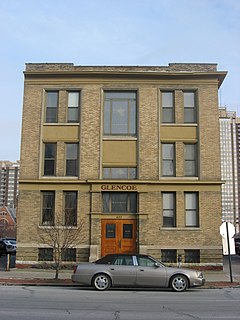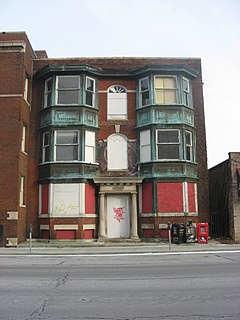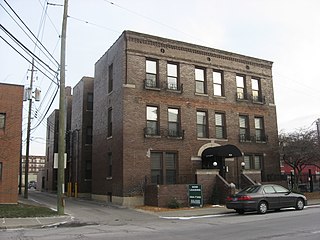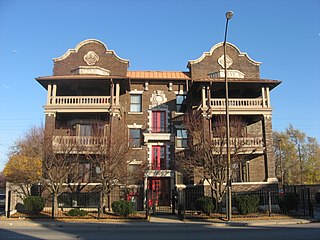
This is a directory of properties and districts included among the National Register of Historic Places listings in Idaho. There are approximately 1,000 sites in Idaho listed on the National Register. Each of the state's 44 counties has at least one listing on the National Register.

The Judge Charles P. McCarthy House is a two-story Prairie school duplex which was constructed in Boise, Idaho in 1913. It was adapted from a Frank Lloyd Wright design published in the April 1907 edition of Ladies Home Journal Magazine, where readers could purchase plans for a flat rate, or have them customized by Wright's office for a 10% premium. It appears as a classic prairie-style design with horizontal design elements, including a low-pitch roof with deep hipped roof overhangs.

The Baker, also known as Massala, is a historic apartment building located at Indianapolis, Indiana. It was built in 1905, and is a three-story, 10-bay by 12 bay, Classical Revival style brick building with Queen Anne style design elements. It has limestone detailing and features paired two-story bay windows on the upper floors.

The Wilson is a historic Renaissance Revival apartment building located at 643 Fort Wayne Avenue in Indianapolis, Indiana, United States. It was built in 1905 amid an apartment-building boom; more than fifty such apartment buildings were completed in what is now central Indianapolis in 1905 alone.

The Cathcart is a historic apartment building located at 103 E. 9th St. in Indianapolis, Indiana, United States. It was built in 1909 amid an apartment-building boom in what is now central Indianapolis.
Durango Rock Shelters Archeology Site is also known as the Fall Creek Rock Shelters Site. An Ancient Pueblo People (Anasazi) archaeological site, it is located in Durango in La Plata County, Colorado. People from the Late Basketmaker II and Basketmaker III Eras inhabited the site between AD 1 and 1000.

The Alexandra, also known as Lockerbie Court, is a historic apartment building located at Indianapolis, Indiana. It was built in 1902, and is a three-story, red brick and grey limestone building on a raised basement with Georgian Revival style detailing. It features six three-story polygonal bay windows on the front facade.

The Glencoe is a historic apartment building located at Indianapolis, Indiana. It was built in 1902, and is a three-story, simplified Classical Revival style yellow brick building. It has a metal cornice, limestone detailing, and a brick parapet.

The Harriett was a historic apartment building located at Indianapolis, Indiana. It was built about 1905, and was a three-story, "U"-shaped, Classical Revival style yellow brick and grey limestone building. It has been demolished.

The Lodge is a historic apartment building located at Indianapolis, Indiana. It was built in 1905, and is a three-story, three bay, rectangular, Georgian Revival style red brick building. It features a limestone entrance portico with Ionic order columns and three-story bay windows.

The Pennsylvania is a historic apartment building located at Indianapolis, Indiana. It was built in 1906, and is a three-story, double "H" plan, Classical Revival style red brick and grey limestone building. It features a round arched main entrance, wrought iron balcony grills, and terra cotta coping.

The Vienna is a historic apartment building located at Indianapolis, Indiana. It was built in 1908, and is a three-story, nine bay by seven bay, Classical Revival style yellow brick and grey limestone building. It sits on a rusticated raised basement and has six Tuscan order pilasters. It features projecting pedimented corner pavilions.

Delaware Court is a historic apartment building located at Indianapolis, Indiana. It was built in 1917, and is a two-story, "E"-shaped, Tudor Revival style red brick and grey limestone building on a raised basement. It features a flattened Tudor arched entrance, stepped gables and limestone plaques with heraldic escutcheons.

The Spink, also known as the Jefferson, is a historic apartment building located at Indianapolis, Indiana. It was built in 1922, and is a six-story, "I"-shaped, Tudor Revival style red brick building on a raised basement. It features full six-story projecting bays and two bay units starting on the third floor.

The Chadwick was a historic apartment building located at Indianapolis, Indiana. It was built in 1925, and was a three-story, five bay, "I"-shaped, Georgian Revival style buff brick building with limestone detailing. It featured Tuscan order engaged columns at the entrance. It was destroyed by fire in January 2011.

The Ambassador is a historic apartment building located at Indianapolis, Indiana. It was built in 1924, and is a large six-story, tan cinder brick building. The first floor has Chicago school style commercial storefronts. It has a recessed entrance with detailed metal canopy and features Sullivanesque terra cotta ornamental detailing.

Delaware Flats is a historic apartment building located at Indianapolis, Indiana. It was built in 1887, and is a three-story, ten bay wide, Classical Revival style painted brick and limestone building. The first floor has commercial storefronts with cast iron framing. The upper stories feature two-story blank arches with Corinthian order pilasters.

The Sid-Mar is a historic apartment building located at Indianapolis, Indiana. It was built in 1887, and is a three-story, triangular, Italianate style red brick building. It has commercial storefronts on the first floor and segmental arched and projecting bay windows on the upper floors.

Coulter Flats also known as The Coulter, is a historic apartment building located at Indianapolis, Indiana. It was built in 1907, and is a three-story, six bay by six bay, Tudor Revival / Jacobean Revival style brick building with terra cotta ornamentation on a raised basement. It is of hollow tile and concrete framing. It features porches and Flemish gables.




















